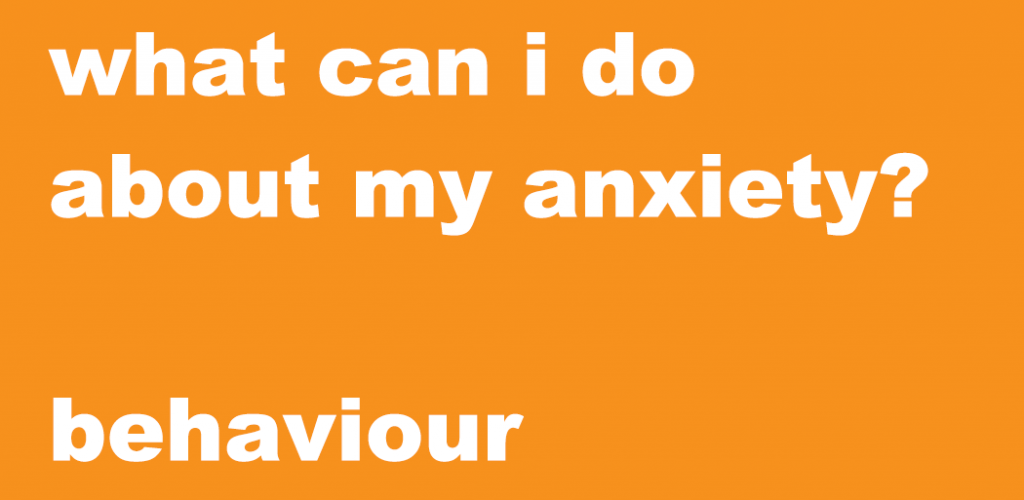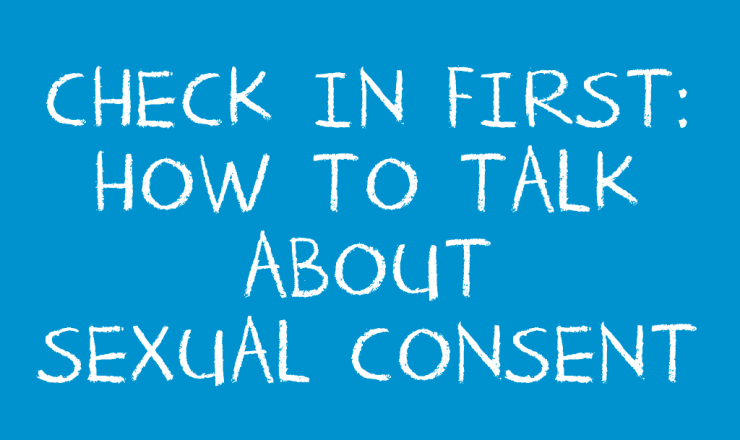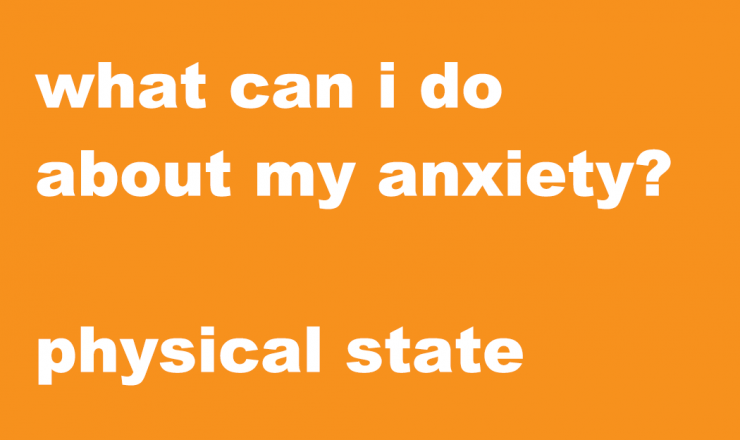What can I do about my anxiety? – Behaviour
Your emotions, physical body, thoughts and behaviours are all linked. What happens in one area usually impacts what is happening in another area. For example, if you are feeling overwhelmed by your school workload (emotion) you may become tense and jittery (physical state); you may think an anxious thought like “I am going to fail my class” (thought); and you may stay up all night studying (behaviour). This could create a cycle that causes more anxious emotions, thoughts, physical states and behaviours.
However, you can also use these links to decrease the overall impact of anxiety. For example, when you are feeling overwhelmed (emotion), you can practice deep breathing to lower your heart rate (physical state), which could allow you to think more clearly.
When it feels possible, you can practice managing and coping with your behaviours, emotions, thoughts and physical states to encourage more calmness. The more you practice, the easier it gets to cope and manage. Remember that you are not defined by your anxiety, or by your thoughts, feelings, behaviours, or physical states.
The following pages show some things you can do to cope with anxiety.
Behaviour
Eating and Sleeping Regularly
To better cope with the symptoms of anxiety, consider whether it might help to make some changes to make sure you are eating and sleeping regularly.
- For youth 14-17 years old, try to get 8-10 hours of sleep per night.
- For youth 18 years and older, try to get 7-9 hours of sleep per night.
- You can use the “Lengthening your breath” breathing technique to help you fall asleep.
- Eat plenty of colourful vegetables and fruits, foods with protein, healthy fats, whole grains and stay hydrated with lots of water. Visit food-guide.canada.ca for more resources.
Caffeine
Anxiety symptoms may be caused by consuming too much caffeine in things like coffee and chocolate. You may be able to reduce anxiety symptoms by reducing caffeine intake.
Physical Exercise
It may be helpful to engage in physical exercise to reduce anxiety symptoms. You can do things like go for a walk, practice yoga, go for a swim at a community centre, or any other activity that feels good. Notice if these activities help you with anxiety.
Spend Time in Nature
It can be helpful to spend time in nature to decrease anxiety symptoms. This can include spending time in greenhouses, in plant stores, in public parks, at the waterfront and more. Some free or low-cost options to spend time in natural, green spaces in the GTA are listed on the page Resources for managing anxiety.
Avoidance and Procrastination
Sometimes feeling anxious might cause you to procrastinate, where you avoid tasks that are necessary and important. Avoiding a task might feel good in the short-term, but could lead to increased anxiety later on. Notice if this happens to you. The following techniques can be used to help:
- Use website blockers when needed
- When you are trying to accomplish a task, it is important to just get started. Start by working on a task for 2-5 minutes. You can break up big tasks into smaller steps until the task feels like it is small enough to finish.
- Think about what activities you do when you are avoiding a task (eg. going online, watching Netflix) and try to limit those distractions during the time you are working on your task.
- Pomodoro Technique: Work on a task for 25 minutes, and then take a 5 minute break. After you do four cycles, take a longer break of 15-20 minutes.
| Note on Techniques |
| These are just a few techniques that you can try out on your own. Just because one technique works for you, doesn’t mean that all of them will. Take what works for you, and leave the rest. |
This series contains things you can do that might help you to cope with and manage anxiety. Other pages in this series include:
- What is anxiety?
- What can I do about my anxiety? – Physical State
- What can I do about my anxiety? – Thoughts
- Resources for managing anxiety
If you have questions about this topic, feel free to contact one of our peer educators. [Link]
Last Edited: March 2020







